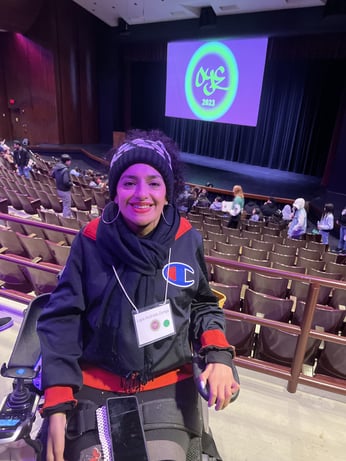Peer & Family Support Program Spotlight: Ligia Andrade Zúñiga
Join Our Movement
What started as an idea has become a national movement. With your support, we can influence policy and inspire lasting change.
Become an Advocate
In 2013, she became a director at Sexability, and in 2018, she co-founded the Bay Area Sexuality and Disability Network, which provides access to sexuality education, information, and services for the disability community. Zúñiga also participated in Everlasting Love, a 40-episode YouTube series focusing on different perspectives and relationships for people living with spinal cord injury, multiple sclerosis, and amyotrophic lateral sclerosis (ALS).
Part of Zúñiga’s motivation as an activist is to combat the disability stigma in the Latinx community.
“Our culture is very community-oriented, and we are very helpful to each other; however, there is a perception that people with a disability are sick. We are often lumped in with seniors,” says Zúñiga, whose parents emigrated from Guatemala in the late 1970s. “There is not much room for us to be a productive part of the community, but I’m working to change that.”
Ten years ago, Zúñiga became a commissioner at the San Mateo County Commission on Disabilities to help provide education, advocacy, and awareness for county residents with a disability. The same year, she joined the board of directors of the Center for Independence of Individuals with Disabilities. Two years later, she became the chair of the San Mateo County Public Authority Advisory Committee.
“Disability is a culture, and we are part of human diversity. I do the work I do because there are not many of us, and if we aren’t present, people will make decisions for us,” says Zúñiga. “Some people with disabilities aren’t able to be advocates. I’m fortunate that I can help, and that’s why I do so many things.”
In 2020, Zúñiga was elected to the board of trustees for the San Mateo Union High School District. The board represents six cities, 10 schools and over 9,000 students. In 2024, she will become the board president.
“I was always involved while my kids were in school because I wanted to provide visibility and representation for parents with a disability,” says Zúñiga, whose two sons are now adults. “I want to be sure all students have access to the resources and services they need to succeed, whether they have a disability, are multilingual learners or have any other underserved or underrepresented identity.”
Even with all her work to advocate for so many different communities, she believes that peer support is one of the best things someone can do.
“It is truly a life-changer. Even if you have many friends and family who support you, they are not experiencing the same things you are. It’s different,” says Zúñiga. “Mentoring gives you hope to see what is possible. It allows you to set goals for yourself and is excellent for mental health. It eliminates ideas of failure and improves self-esteem. Most of all, it keeps you visible and provides the validation to see what the future can hold.”
You can request a Peer & Family Support Program mentor here.
